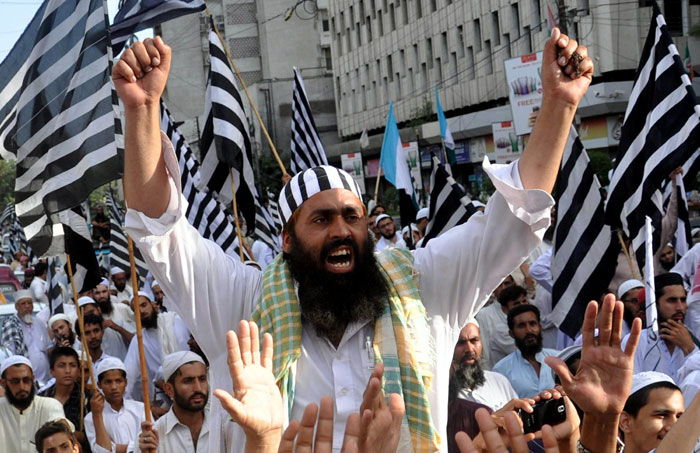Supporters of Jamiat Ulema-e-Islam (JUI) hold party flags during a protest against government in Karachi on Friday. Imran Khan and Tahir-ul-Qadri have led week-long anti-government protests to demand Prime Minister Nawaz Sharif’s resignation.
AFP/Islamabad
The party of Pakistani opposition politician Imran Khan said on Friday it was resuming talks with the government aimed at ending tense protests demanding the removal of Prime Minister Nawaz Sharif.
Former cricketer Khan and populist cleric Tahir-ul-Qadri have led thousands of supporters demonstrating outside parliament this week calling for Sharif to go.
Khan insists the May 2013 general election, which swept Sharif to power in a landslide, was rigged, though observers rated it free and credible.
Sharif's Pakistan Muslim League-N (PML-N) party insists he will not quit and accuse the protesters of undermining the country's fragile democracy.
The standoff has raised fears of possible military intervention - the country has seen three coups since its creation in 1947 - though analysts say the army is more likely to use the crisis to assert influence behind the scenes than stage an outright power grab.
Talks to resolve the impasse that began on Wednesday stalled almost immediately, with Khan sticking to his hardline stance that Sharif must go before he would negotiate.
But his Pakistan Tehreek-e-Insaaf (PTI) party on Friday said dialogue was restarting through contact with the governor of Punjab, Pakistan's most populous province.
"We are resuming talks with the government," PTI vice-chairman Shah Mehmood Qureshi said.
Senior members of Qadri's team have said they are ready for "meaningful dialogue" to end their protest, though little concrete progress appears to have been made since initial contact began on Wednesday.
The two protest movements are not formally allied and have different goals, beyond toppling the government. But their combined pressure - and numbers - have given extra heft to the rallies.
If one group were to reach a settlement with the government and withdraw, the other's position would be significantly weakened.
Neither movement has mobilised mass support beyond their core followers and opposition parties have shunned Khan's call to unseat the government and begin a campaign of civil disobedience.
Maulana Fazalur Rehman, chief of the religious Jamiat Ulema-e-Islam (JUI-F) party said the protests had no support from the majority of Pakistan's 180mn population.
"They have been isolated and people of Pakistan have rejected them - there are maximum 5,000 to 6,000 people combined with them at night," he said.
Despite rumours that the military had some hand in the protests, the Minister for Water and Power Abid Sher Ali, a PML-N stalwart, insisted there was "no pressure on us from any state institution to resign."
"It is the imagination of some lawless and outside elements camping out there," he said.
But if a full-blown coup looks unlikely - such a move could jeopardise billions of dollars in foreign assistance and trade deals - analysts say the crisis will leave Sharif weakened.
"The protests rocking Islamabad threaten to upend the constitutional order, set back rule of law and open the possibility of a soft coup, with the military ruling through the back door," the International Crisis Group wrote.

